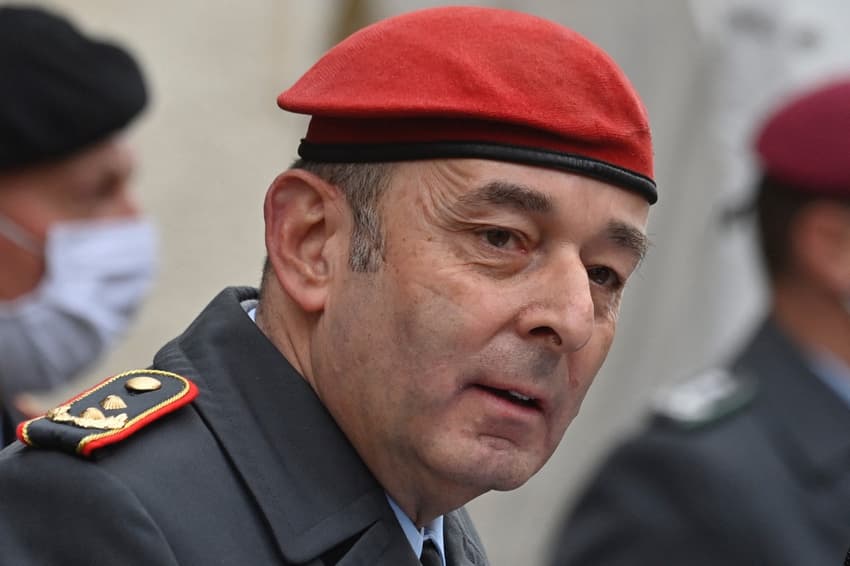Germany needs to be 'war ready' in 5 years: army chief-of-staff

The German army's chief-of-staff said the country's military needs to be "war ready" in five years because of growing threats.
General Carsten Breuer told newspaper Die Welt in an interview published Sunday that for the first time since the end of the Cold War the country faces "the possibility of a war imposed from outside."
Breuer said being ready for war involved a "change of mentality" as well as improving Germany's military training and capacity.
This came as NATO's secretary general Jens Stoltenberg called on Europe to increase its arms production to support Ukraine and prevent "potentially decades of confrontation" with Moscow, in an interview published by German media Saturday.
Ahead of a key meeting of NATO defence ministers in Brussels and the second anniversary of the Russia-Ukraine war, Stoltenberg insisted that "we need to reconstitute and expand our industrial base faster, to increase deliveries to Ukraine and refill our own stocks."
"This means shifting from slow peacetime to high-tempo conflict production," he told the German Sunday paper Welt am Sonntag.
Stoltenberg's comments came amidst growing pleas for shells, ammunition and other military aide from Ukraine as it battles Russian forces into a third year.
Western leaders have also called for greater assistance. Germany's Chancellor Olaf Scholz and President Joe Biden urged US lawmakers Friday to approve a long-delayed military aid package for Ukraine, warning that Kyiv could not hold off Russia's invasion without it.
"The failure of the United States' Congress in not supporting Ukraine is close to criminal neglect," Biden said as he hosted Scholz in the Oval Office on Friday.
'Best defence'
Stoltenberg said: "There is no imminent military threat against any ally. At the same time, we hear regular threats from the Kremlin against NATO countries."
Russia's invasion of Ukraine nearly two years has shown that "peace in Europe cannot be taken for granted", the NATO chief said, emphasising the importance of protecting countries in the alliance.
"As long as we invest in our security and we stay united, we will continue to deter any aggression," he said.
"NATO does not seek war with Russia, but we need to brace ourselves for potentially decades of confrontation," he added.
"We monitor closely what Russia does and we have increased our presence in the eastern part of the alliance," Stoltenberg said.
"If Putin wins in Ukraine, there is no guarantee that Russian aggression will not spread further. So supporting Ukraine now and investing in NATO's own capabilities is our best defence."
NATO defence ministers will meet in Brussels on February 15, one week ahead of the second anniversary of Russia's offensive in Ukraine. A meeting of the Ukraine Defense Contact Group will be a key feature of the talks.
Comments (1)
See Also
General Carsten Breuer told newspaper Die Welt in an interview published Sunday that for the first time since the end of the Cold War the country faces "the possibility of a war imposed from outside."
Breuer said being ready for war involved a "change of mentality" as well as improving Germany's military training and capacity.
This came as NATO's secretary general Jens Stoltenberg called on Europe to increase its arms production to support Ukraine and prevent "potentially decades of confrontation" with Moscow, in an interview published by German media Saturday.
Ahead of a key meeting of NATO defence ministers in Brussels and the second anniversary of the Russia-Ukraine war, Stoltenberg insisted that "we need to reconstitute and expand our industrial base faster, to increase deliveries to Ukraine and refill our own stocks."
"This means shifting from slow peacetime to high-tempo conflict production," he told the German Sunday paper Welt am Sonntag.
Stoltenberg's comments came amidst growing pleas for shells, ammunition and other military aide from Ukraine as it battles Russian forces into a third year.
Western leaders have also called for greater assistance. Germany's Chancellor Olaf Scholz and President Joe Biden urged US lawmakers Friday to approve a long-delayed military aid package for Ukraine, warning that Kyiv could not hold off Russia's invasion without it.
"The failure of the United States' Congress in not supporting Ukraine is close to criminal neglect," Biden said as he hosted Scholz in the Oval Office on Friday.
'Best defence'
Stoltenberg said: "There is no imminent military threat against any ally. At the same time, we hear regular threats from the Kremlin against NATO countries."
Russia's invasion of Ukraine nearly two years has shown that "peace in Europe cannot be taken for granted", the NATO chief said, emphasising the importance of protecting countries in the alliance.
"As long as we invest in our security and we stay united, we will continue to deter any aggression," he said.
"NATO does not seek war with Russia, but we need to brace ourselves for potentially decades of confrontation," he added.
"We monitor closely what Russia does and we have increased our presence in the eastern part of the alliance," Stoltenberg said.
"If Putin wins in Ukraine, there is no guarantee that Russian aggression will not spread further. So supporting Ukraine now and investing in NATO's own capabilities is our best defence."
NATO defence ministers will meet in Brussels on February 15, one week ahead of the second anniversary of Russia's offensive in Ukraine. A meeting of the Ukraine Defense Contact Group will be a key feature of the talks.
Join the conversation in our comments section below. Share your own views and experience and if you have a question or suggestion for our journalists then email us at [email protected].
Please keep comments civil, constructive and on topic – and make sure to read our terms of use before getting involved.
Please log in here to leave a comment.